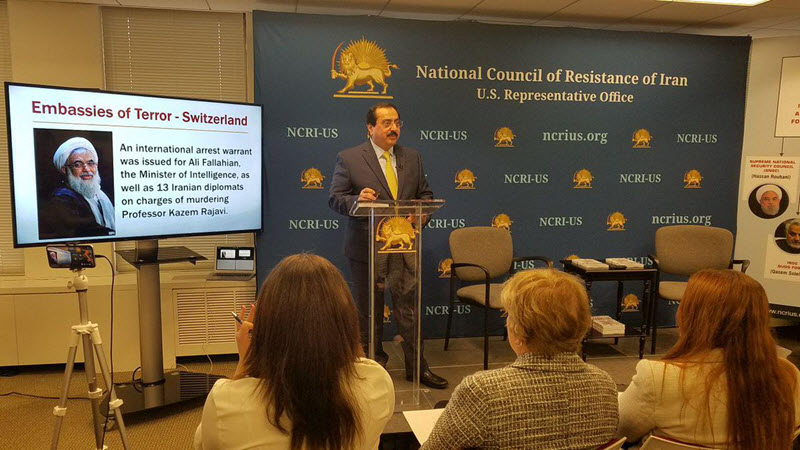
By Armin Baldwin
In response to the Iranian regime’s alleged use of their embassies to plot terror attacks against its political opponents across the continent, European nations are being called upon by the popular Iranian resistance group, the National Council of Resistance of Iran (NCRI), to shut down Tehran’s embassies.
While the Trump administration escalates sanctions against President Hassan Rouhani’s Islamic Republic, NCRI Deputy Director Alireza Jafarzadeh told reporters at a news conference in Washington, D.C., “What we are calling for is closing the Iranian regime’s embassies.” The Deputy Director added, “These diplomatic relations have allowed the regime to plot terrorist attacks and assassinations in the West.”
The release of the group’s new book “Iran’s Emissaries of Terror,” was the focus of the news conference. The book attempts to explain Tehran’s use of embassies in plotting terror attacks against political opponents in the U.S. and Europe. In recent years, especially in 2018, Iranian-backed plots have surged — and the NCRI logged 10 instances of terror plots or terror-related arrests against Iranian officials.
For instance, the plot to bomb the NCRI’s annual gathering of Iranian dissident groups in Paris last summer, was was attended by Trump lawyer Rudy Giuliani, among many other US and UK politicians and celebrities.
An Iranian diplomat, Assadollah Assadi, based in Vienna was one of four arrested for the plot. He is alleged to be a member of Iran’s intelligence agency (MOIS) by German prosecutors. He has been charged with activity as a foreign agent and conspiracy to commit murder.
According to the NCRI, the MOIS is a central organization in Tehran’s terror operations abroad. On Wednesday, they called for the West to brand the group a foreign terrorist organization (FTO). In fact, last year, dissidents told Fox News that there has also been considerable concern about the regime’s presence in Albania, where the Iranian embassy is alleged to be staffing up and has sent top intelligence operatives.
More than 2,000 Iranian dissidents belonging to People’s Mujahedin of Iran (MEK) were relocated from Iraq in 2016, and a senior U.S. counterterrorism official told Fox News that Albanian authorities arrested two Iranian operatives on terror charges last year.
There have been arrests and alleged plots revealed in Britain, Germany, Turkey and the U.S. signaling Iran’s increased terror movements in the West, and the country’s increased presence in Europe has posed difficulties for European countries seeking to rally support for the 2015 Iranian nuclear deal after the U.S. withdrew from the deal last year.
This past month, the Trump administration branded Iran’s Revolutionary Guard an FTO. Last month, Secretary of State Mike Pompeo described a “concerted assassination effort” in Europe by the Iranians. Pompeo said, “This is an effort by the leaders of the Islamic Republic of Iran – the president, Rouhani, who’s the president of Iran, is permitting to take place, where they’re going to Europe and killing people on European soil. This is unacceptable in Western Europe.”
While Iran’s terror movement has set off alarms in the U.S. and Europe, the response from European countries in particular has been “tepid,” says the NCRI. “Although several agents were arrested on terrorism and espionage-related charges in the U.S. and Europe in 2018, one top terrorist-diplomat is in prison, and five others, including an ambassador, were expelled, a multilateral Western approach to Tehran’s rogue behavior remains elusive,” the group says in its book.
The NCRI’s has called for the State Department to designate MOIS an FTO, and for Europe to shut down Iran’s embassies. “Tehran’s terrorist diplomats should be brought to justice or expelled, and its embassies shut down. They have been and remain the nerve centers of espionage and terrorism and critical to Tehran’s terrorist operations abroad,” their new book says.
Regarding sanctions waivers, Pompeo said at a press conference, “We are going to zero. How long we remain there at zero depends solely on the Islamic Republic of Iran’s senior leaders.”
National Security Adviser John Bolton also told “Fox News Sunday” that the Trump administration’s policy was having a significant effect. “[The policy] is to put maximum pressure on the regime to change its behavior, and I think it’s working, and I think that’s what they’re worried about.”







